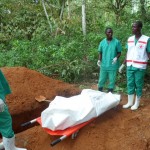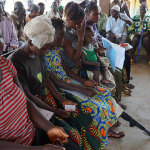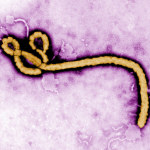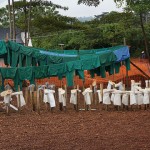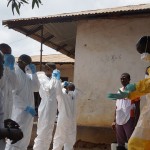This briefing summarises the attitudes of Monrovia community leaders and residents towards cremation, mass burials, memorialization, and remembrance ceremonies based on data collected between August – September 2014.
Some attention has been paid to the alleged role of funerals in spreading Ebola Virus Disease in Upper West Africa. This has led to attempts to control funerals, causing both distress and active resistance. Critical examination of the role of the funeral event as a mechanism of Ebola transmission seems in order. In this paper, it is argued that funerals are inseparable from care for the sick, as far as Ebola transmission is concerned. The focal issue then becomes not control of funerals but reduction
Continue reading →
While this briefing note identifies arenas of particular significance with regard to burial practices, such practices are not standardised, are likely to change as social responses to Ebola evolve, and therefore need to be discussed on a locality by locality basis. Key points are given in this policy brief, followed by a more substantial discussion of burial and cultural practices that increase risk of EVD transmission.
‘The Ebola epidemic ravaging parts of West Africa is the most severe acute public health emergency seen in modern times. Never before in recorded history has a biosafety level four pathogen infected so many people so quickly, over such a broad geographical area, for so long’ (Margaret Chan, 26th September 2014, WHO). This report focuses on the local beliefs and practices around illnesses and death, the transmission of disease and spirituality, which affect decision-making around health-seeking behaviour, caring for relatives and the nature of burials.
Continue reading →
Burials in times of Ebola or Marburg outbreaks have to follow strict biosafety rules to avoid transmission of Ebola/Marburg virus. At the same time, they should be acceptable to families and communities to avoid resistance against disease control. This document deals predominantly with acceptability issues.
The aim of this briefing paper is to consider the various ways in which widely reported fear and resistance to the Ebola response can be understood, and what each way of understanding offers to those battling with the current epidemic. As far as this paper is concerned, there is no single ‘right way’ to comprehend resistance to educators, medics and burial teams, as this is a very complex social phenomenon. The aim instead is to outline the variety of ways in which resistance can be
Continue reading →
Held as part of the African Studies Association conference 2014, Ebola: The Challenges united an esteemed panel of speakers to discuss ways in which academia can mobilise to support those effected by the ebola outbreak.
